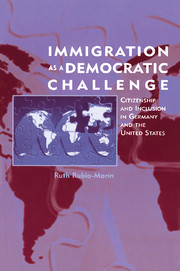Book contents
- Frontmatter
- Contents
- Acknowledgements
- 1 Introduction
- 2 A democratic challenge
- 3 Fair to whom?
- 4 Safeguarding liberal democracy from itself
- 5 Inclusion without consent
- 6 Keeping nationality relevant
- 7 The constitutional debate in the United States
- 8 The constitutional debate in Germany
- 9 Summary and final remarks
- Bibliography
- Index
- Index of Cases
7 - The constitutional debate in the United States
Published online by Cambridge University Press: 22 September 2009
- Frontmatter
- Contents
- Acknowledgements
- 1 Introduction
- 2 A democratic challenge
- 3 Fair to whom?
- 4 Safeguarding liberal democracy from itself
- 5 Inclusion without consent
- 6 Keeping nationality relevant
- 7 The constitutional debate in the United States
- 8 The constitutional debate in Germany
- 9 Summary and final remarks
- Bibliography
- Index
- Index of Cases
Summary
We now have a normative case for how the inclusion of permanent resident aliens should proceed. But what is actually happening? How have the courts been reacting to the consolidation of a permanent sector of non-citizens among the ordinary population living under the state jurisdiction? Are they advancing through constitutional interpretation in the direction of ensuring the inclusion of resident aliens into the sphere of constitutional equality? If so, on what tacit or express moral grounds are they relying and which constitutional mechanisms are proving most useful? If not, which ones are proving the hardest obstacles to overcome?
Focusing on the constitutional debate is especially interesting in the USA. As a country of immigration, it has traditionally welcomed newcomers. Many of these newcomers were accorded the status of immigrants right from the beginning, and with it came the expectation that they would remain in the country and become citizens through a naturalization which was granted as a matter of course after a certain period of residence in the country. So, given what, with some significant exceptions, appears to be a rich and welcoming immigration policy, looking at the Constitution is very revealing. It is revealing because it helps us to identify whether there have been constraints linked to the community's commitment to a constitutionally sanctioned liberal democracy which have forced inclusion even further than has naturally been the result of the ordinary process of political self-determination expressed through the country's laws on immigration and citizenship.
- Type
- Chapter
- Information
- Immigration as a Democratic ChallengeCitizenship and Inclusion in Germany and the United States, pp. 130 - 185Publisher: Cambridge University PressPrint publication year: 2000



